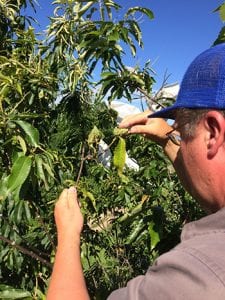
TACF Technical Coordinator, Eric Jenkins crossing the best with the best.
In 2017, Meadowview staff performed 8 crosses between 16 American chestnut BC3-F2 trees that are most resistant chestnut blight. We plan on planting the progeny of these crosses at orchard locations away from other susceptible American chestnut backcross trees. One of these orchards will be a legacy tree orchard in commemoration of donors that have supported TACF’s mission. The legacy tree orchard will be composed of approximately 500 progeny from 16 controlled crosses conducted in 2015 and 2016. The trees will be planted in a secluded section of TACF’s Glenn C. Price Research Farm. In 3 to 5 years, we will inoculate these trees with the fungus that causes chestnut blight to perform additional selection for blight resistance. As these trees reach reproductive maturity in 5-10 years, they will cross via open pollination to reliably generate blight resistant American chestnut seed from the backcross breeding program.
We also performed 3 crosses between 6 BC3-F2 trees that are most resistant to Phytophthora root rot. The progeny from these crosses will be screened for root rot resistance as seedlings and the survivors will be planted at orchard locations previously infested with Phytophthora cinnamomi. The root rot resistant American chestnut backcross selections may be used in future breeding with blight resistant transgenic American chestnut to combine resistance to these diseases.
